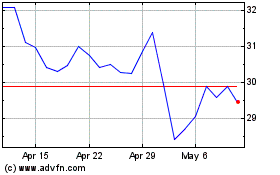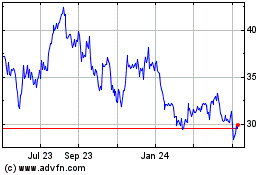Some companies adjust operations to comply with new revenue
regulations
By Tatyana Shumsky
This article is being republished as part of our daily
reproduction of WSJ.com articles that also appeared in the U.S.
print edition of The Wall Street Journal (June 13, 2018).
New accounting rules are prompting some corporate finance chiefs
to change how they do business.
More than half of the S&P 500 companies disclosed some
impact on their accounting policies since December, when new rules
unified how companies account for revenues from sales and services.
The change, which was in the works for more than a decade, replaces
previously disparate, industry-specific rules and aligns U.S.
standards closer to international guidelines.
For finance chiefs of some companies, including Red Hat Inc.,
Ciena Corp. and Mosaic Co., adopting the new revenue recognition
standard from the Financial Accounting Standards Board means
adjusting their business operations to be in line with the new
accounting framework, which is more focused on contracts and when
goods and services are delivered to customers.
Around 380 companies in the stock index have reported under the
new rules as of June 8, and 294 companies in the index disclosed an
impact on financial statements from adopting the standard,
according to Audit Analytics.
Finance teams spent months rewriting accounting processes and
procedures and preparing new financial statements to comply with
the new rules. Roughly one in five public companies surveyed by
PricewaterhouseCoopers LLP said they spent or expected to spend $1
million or more on this effort.
Software-service provider Red Hat previously would tailor the
price for its subscription bundles for each customer. Now, the
Raleigh, N.C., company will have uniform pricing and discounts for
clients of its open-source software, said Chief Financial Officer
Eric Shander. The new reporting rules require companies to more
thoroughly account for the cost of sales, such as discounts and
marketing efforts.
"We're being much more prescriptive on where you're placing the
discount, " Mr. Shander said. "It will be more standardized." The
company closed 169 deals over $1 million during its fourth quarter,
and 81% of them included multiple technologies, he said.
Some companies expect the new rules to accelerate revenue, while
others say the timing of when they can record revenue as earned
will be delayed, even though their underlying business remains
unchanged.
Telecommunications networking-equipment maker Ciena expects to
recognize some of its revenue sooner when it switches over to the
new rules in November, said CFO Jim Moylan. The company's fiscal
year ends in October, giving it some extra time to make the
transition.
"We are certainly talking about how we will restructure our
contracts in a way to get access to that favorable accounting," Mr.
Moylan said.
In the past, Ciena would sell and install its
internet-networking equipment, but only pass title and control to
the customer when everything was deployed. Under the new accounting
rules, the company plans to pass title to its customers sooner so
it can record revenue on the equipment first, and later book the
revenue on the service as it deploys that equipment, Mr. Moylan
said.
"We want to make sure that we're structuring our contracts so
that change of title occurs perhaps earlier than it would have," he
said.
Other companies doubled down on explaining the accounting
changes to investors. Dunkin' Brands Group Inc. held a special call
with analysts and investors last October to discuss pending revenue
accounting changes. CFO Kate Jaspon again walked stakeholders
through the new math during the company's analyst and investor day
in February.
Dunkin' now records its franchise fees over the term of the
related license, among other changes. Previously, Dunkin'
recognized franchise fees up front, either when a new restaurant
was opened or when a renewal agreement became effective.
"Given the sweeping changes to revenue accounting rules, we felt
it was important to educate our investment community on the impacts
to our financial results early in the process and with great
transparency," Ms. Jaspon said in a statement. "In doing so, we
were able to transition into 2018 with a focus on the fundamentals
of our underlying business, which have not changed, and limit any
investor confusion from accounting rule changes."
But other companies are opting to adjust operating practices,
where possible, rather than disrupt the pattern of revenue
investors have come to expect of the business.
Fertilizer maker Mosaic changed some of its arrangements and
systems to ensure that revenue could be recorded when control of
its products -- potash and phosphate -- transferred to the
customer.
"The policy changes did not affect our business economics," said
a Mosaic spokesman, adding that the company complied with the new
accounting rules while also providing investors with consistent
information.
Most businesses say the tweaks are a way to keep the accounting
outcome under the new rules consistent with that of the old rules,
said Adam Brown, national assurance managing partner for accounting
at BDO USA.
"If historically they've had revenue as you go, then that's
where they will consider some changes to preserve when revenue gets
booked," Mr. Brown said.
(END) Dow Jones Newswires
June 13, 2018 02:47 ET (06:47 GMT)
Copyright (c) 2018 Dow Jones & Company, Inc.
Mosaic (NYSE:MOS)
Historical Stock Chart
From Mar 2024 to Apr 2024

Mosaic (NYSE:MOS)
Historical Stock Chart
From Apr 2023 to Apr 2024
